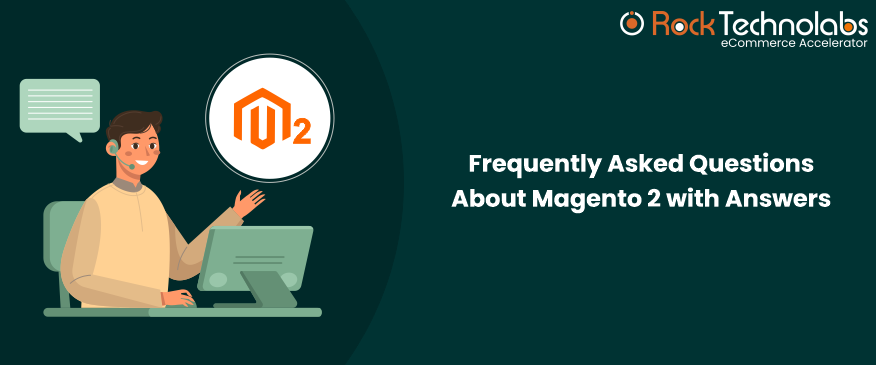FAQs About Magento 2 eCommerce and Its Answers

Adobe Commerce, also known as Magento 2 is a powerful and flexible platform that enables businesses to easily create and manage their online stores. Built on the latest web technologies and designed to meet the needs of modern e-commerce businesses, Magento 2 offers a range of features and capabilities that enable businesses to create customized and engaging online shopping experiences for their customers.
With its intuitive user interface, flexible architecture, and extensive range of extensions and integrations, Magento 2 is widely regarded as one of the most popular and versatile e-commerce platforms available today. It is trusted by some of the biggest global companies such as Coca-Cola, & Ford. Whether you want to start your online business on Adobe commerce platform or you already have store on Magento commerce platform, you must have many questions in your mind. We have compiled the most frequently asked questions about Magento 2.
Let’s Have a Look at Frequently Asked Questions (FAQs) About Magento 2:
1. What is the Magento platform or Adobe Commerce?
Magento platform, now an Adobe Commerce, is an open-source e-commerce platform for creating online stores. It was developed by Varien Inc. and was released in 2008.
Magento 2 eCommerce is an advanced and robust platform that allows businesses to bring their business online with traffic-driven storefronts. With a wealth of features, customizations, and integrations, Magento 2 provides businesses with the flexibility and scalability to grow and succeed in the competitive world of e-commerce.
Magento is an Adobe Commerce now after Adobe acquired it. Still, many ecommerce developers termed it as “Magento Commerce”.
2. Is Magento 2 free to use?
Firstly, Magento 2 is available in two editions: Open source (previously known as community edition) and Commerce (enterprise edition). Magento open source is free to download and use. The commerce requires a license fee.
The open source edition may not provide all the advanced features and functionalities that businesses require, such as B2B capabilities or enhanced security features. In these cases, businesses may need to move to Magento 2 commerce.
LEARN MORE : Difference between Magento Open Source and Magento Commerce
3. What is Adobe Commerce used for?
Adobe Commerce is a powerful & cutting-edge feature-rich e-commerce platform used for creating eCommerce solutions.
It offers product management, order management, payment and shipping options, and marketing and promotional tools.
It is designed for businesses of all sizes, with the Adobe Commerce version, providing additional features and support for larger businesses.
4. What are the features of Magento 2?
Magento 2 offers a range of features.
- Enhanced performance and scalability
- B2B, B2C and D2C in one platform
- Payment services
- CMS page builder for easy promotion
- Better security features
- Mobile responsiveness
- Multi-store capabilities
- Personalization
- AI powered platform
LEARN MORE : Magento 2 Features To Make Your Store Advanced
5. What is the difference between Magento 1 and Magento 2?
Magento 2 is a major update to the Magento platform and includes significant changes from Magento 1. Magento 1 support ended on June 2020. It is also known as Magento 1 End of Life. Merchants who are running their store on Magento 1, they must migrate to Magento 2. Magento 2 offers improved performance, scalability, and security features compared to Magento 1.
LEARN MORE : Magento 1 Vs Magento 2
6. What are the advantages of Magento 2?
The advantages of Magento 2 include enhanced performance and scalability, improved checkout and payment options, better security features, and a more user-friendly interface. It also has features such as mobile responsiveness, multi-store capabilities, and an extensive extension marketplace. Additionally, Magento 2 offers better support for mobile devices and multi-store capabilities. One of the key benefits of Adobe Commerce is its flexibility and scalability. It allows businesses to customize their online store’s look and feel, functionality, and integration with other systems like CRM, ERP, and payment gateways.
LEARN MORE :
7. What is the cost of Adobe Commerce?
The cost of Adobe Commerce varies depending on the specific needs of a business. Pricing varies according to size of business and the specific features and support needed. Adobe Commerce offers a range of pricing plans, including a subscription-based model with hosting, support, and access to additional features.
LEARN MORE : Adobe Commerce Pricing
8. What are B2B features in Magento 2?
Some of Magento 2 B2B features are mentioned below.
- Advanced pricing options: Magento 2 enables businesses to set up custom pricing for individual customers or customer groups based on their order history, contract terms, and other factors.
- Custom catalogs and product catalogs: Magento 2 allows businesses to create custom catalogs or product catalogs for specific customer groups, including unique pricing, product selection, and payment terms.
- Enhanced order management: It provides businesses with the ability to manage and track orders across multiple channels and locations, including online, mobile, and in-store.
- Quick order functionality: With Magento 2’s quick order functionality, businesses can allow their B2B customers to quickly add multiple products to their cart using a CSV file or by entering product SKUs and quantities.
- Account management: Magento 2 allows B2B customers to create and manage their accounts, including viewing order history, tracking shipments, and access invoices.
- Payment and credit options: This platform offers B2B businesses the ability to choose a range of payment and credit options, including invoice payments, credit lines, and installment payments.
- Quoting and negotiation: With Magento 2, businesses can enable B2B customers to request quotes, negotiate prices, and create custom orders.
LEARN MORE : Key B2B Features of Magento Commerce
9. What is the current version of Magento 2?
The current version of Magento is Adobe Commerce 2.4.6. The release featuring over 300 quality fixes and enhancements, including upgraded core composer dependencies and third-party libraries. Additionally, the release incorporates performance and scalability enhancements to boost overall user experience.
10. What are the skills required for a Magento developer?
- Knowledge of PHP: Magento is built using PHP, so a good understanding of the language is essential.
- Understanding of Magento architecture: A Magento developer should have a deep understanding of the Magento architecture and how its different components work together.
- Proficiency in JavaScript and CSS: Magento developers should have a solid understanding of JavaScript and CSS, as these are used heavily in front-end development.
- Familiarity with database management: Magento relies heavily on databases to store and retrieve data, so developers should be proficient in managing databases.
- Knowledge of the MVC framework: Magento uses the Model-View-Controller (MVC) framework, and developers should be well-versed in this architecture.
- Familiarity with version control: Magento developers should have experience working with version control systems like Git or SVN.
- Strong problem-solving skills: Magento developers should be able to identify and troubleshoot issues quickly and effectively.
- Understanding of web security best practices: Magento developers should be well-versed in web security best practices and should be able to implement them in their work.
- Experience with third-party integrations: Many Magento projects require integration with third-party systems like payment gateways, shipping providers, and marketing tools.
- Knowledge of Magento extensions and modules: Developers should have experience with Magento 2 extension development, as these are often used to extend the functionality of Magento.
LEARN MORE : Skills Every Magento Developer Should Have
11. How to hire a Magento developer?
If you’re planning to develop an online store using Magento, one of the key decisions you’ll have to make is choosing the right Magento developer. Here are some points to consider when hiring a Magento developer:
- Look for experience: Magento is a complex platform, and it’s important to hire a developer with experience working with it. Look for developers who have worked on similar projects and have a track record of delivering quality work.
- Check references: Ask for references and check them carefully. This will give you an idea of the developer’s past performance and whether they are reliable.
- Review their portfolio: A developer’s portfolio is a good way to assess their skills and experience. Look for examples of similar projects they have worked on, and check for user-friendly designs, optimized speed, and overall quality.
- Consider communication skills: Communication is key when working with a developer. Choose someone who can effectively communicate technical details in a way that is easy for you to understand. Make sure they are responsive to your questions and concerns.
- Check for Magento certifications: Magento offers certifications to developers who have passed a series of tests to demonstrate their expertise with the platform. Look for developers who have earned these certifications to ensure they have a strong understanding of Magento’s features and functionality.
- Discuss pricing and timelines: Discuss pricing and timelines upfront to avoid any surprises later on. A good developer will provide you with a detailed estimate of costs and timelines before beginning work.
- Consider ongoing support: Building an online store is just the first step. Make sure your developer is available for ongoing support and maintenance as your business grows and your needs change.
12. Where can I hire Magento developers?
There are several options available when it comes to hiring Magento developers. One of the best ways to find experienced and reliable Magento developers is through online platforms that connect businesses with freelancers or development agencies.
Another option is to search for companies that offer Magento development services. Experienced companies typically have a team of experienced Magento developers who specialize in different aspects of the platform, from design and development to integration and maintenance with quick turnaround time & 24×7 support. At Rock Technolabs, you can find Magento developers suitable for your eCommerce project.
Lastly, businesses can attend Magento events such as Meet Magento or Adobe Summit to network with Magento developers and companies. These events provide a unique opportunity for businesses to meet with experienced professionals, learn about the latest developments in the platform, and explore potential partnerships.
13. What is a Magento partner?
A Magento partner is a company that has been authorized and certified by Magento, an eCommerce platform, to provide a range of services related to Magento, including design, development, integration, support, and consultation services.
To become a Magento partner, a company must meet certain criteria, such as having a proven track record of delivering high-quality Magento solutions, employing certified Magento developers, and having a good reputation in the eCommerce industry.
Partnering with a Magento partner can bring many benefits, such as access to specialized expertise, reliable support, and innovative solutions to help businesses grow and succeed in the competitive eCommerce landscape.
Magento also offers three levels of partnership based on the size and scope of the partner’s business. These levels are Gold, Silver, and Bronze solution partner.
Gold and silver solution partners are typically large, established businesses with a strong presence in the Magento ecosystem. They have a high level of technical expertise, and are capable of delivering complex Magento solutions to their clients. Bronze solution partners are usually mid-sized companies that have demonstrated a solid track record of success with Magento, and have a good understanding of the platform and its capabilities.
Regardless of the partnership level, working with a Magento partner can help businesses to leverage the platform’s capabilities and deliver high-quality eCommerce solutions to their clients.
LEARN MORE : What are Magento Partners?
14. What are Magento development services?
Magento development services are professional services offered by companies or developers to help businesses create, design, develop, and maintain their online stores.
Here are the key points describing Magento development services:
- Website design and development services to create visually appealing and user-friendly online stores that are optimized for speed, security, and performance.
- Custom module development services involve creating bespoke modules or extensions that add specific functionality to the Magento platform.
- Magento Integration services enable businesses to integrate their online store with third-party services, such as payment gateways, shipping providers, and marketing tools.
- Magento 2 support and maintenance service including bug fixes, security updates, and performance optimization.
- Consulting services to help businesses make the most of the Magento 2 platform and optimize their online store for better performance and customer engagement.
>Ask us Any Questions Related to Magento 2!
Hope we answered all the necessary questions that were wandering in the mind of online merchants.
If you are a Magento 2 store owner, we can help you to escalate your business with our vast experience and specialization in the ecommerce domain since the past 9+ years. We have helped brands earn 2x revenue within a defined time-frame, let us help you too!








